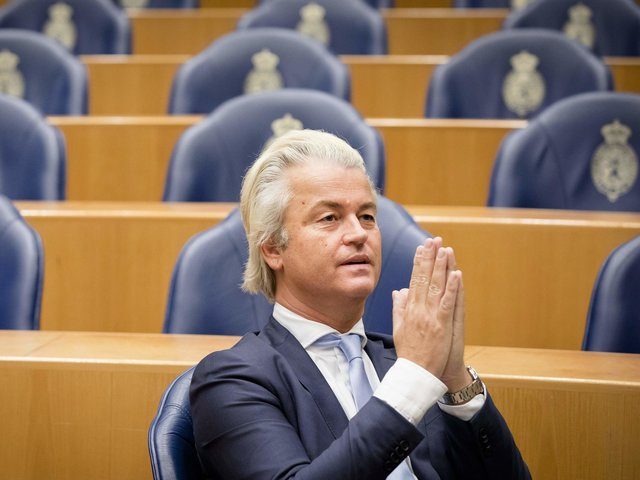(AFP) – Populist Dutch MP Geert Wilders will learn his fate Friday when judges hand down their verdict in his closely watched hate speech trial, just over three months ahead of crucial parliamentary elections.
Prosecutors are seeking a 5,000-euro ($5,300) fine for the firebrand politician, who faces charges of insulting a racial group and inciting racial hatred after comments he made about Moroccans living in the Netherlands.
Wilders, 53, whose far-right Freedom Party (PVV) is spearheading polls ahead of a crunch vote on March 15, told AFP on Thursday he won’t be present at the high security courthouse near Schiphol airport.
He’ll “issue a video reaction in English and Dutch,” afterwards said Wilders, who is represented by his lawyer Geert-Jan Knoops.
Latest polls put the PVV at 34 seats in the 150-seat lower house of Dutch parliament, some 10 seats ahead of his nearest rival, Prime Minister Mark Rutte’s Liberals.
Amid a string of populist victories in Europe and the November election of Donald Trump as the next US president, the outcome of the Dutch vote will be keenly watched.
Observers say rather than hurting the controversial lawmaker, his trial has boosted his popularity among Dutch voters, worried about the influx of immigrants and driven by eurosceptic sentiments.
– ‘Fewer Moroccans’ –
The three-week trial of Wilders focused in particular on a statement made at a March 2014 local government election rally in The Hague, when he asked supporters whether they wanted “fewer or more Moroccans in your city and in the Netherlands”.
When the crowd shouted back “Fewer! Fewer!” a smiling Wilders answered: “We’re going to organise that.”
Prosecutors told a three-judge bench they dragged Wilders to court because “racist remarks need to be stopped” after police received 6,400 complaints about his comments.
Such remarks “affect human dignity to the core,” Wouter Bos told the trial, adding “freedom of speech goes hand-in-hand with duties and responsibilities. It’s not an absolute”.
Throughout their case, prosecutors quoted numerous examples of Dutch-Moroccans who said they felt like “third-rate citizens” and that even “children are afraid” because of the politician’s statements.
Wilders boycotted most of the high-profile trial, which he called a “disgrace” as he frequently tweeted his opinions.
On the last day, he finally appeared in the dock and remained unapologetic, saying if he is found guilty “millions of Dutch citizens will be convicted with me”.
The firebrand lawmaker with his trademark peroxide hair said “it is my right and my duty as a politician to speak about the problems in our country”.
Wilders also accused prosecutors and opposition politicians of directing a “parliamentary process” against him ahead of the March polls.
Political observers say whether convicted or acquitted, Wilders will benefit either way by the publicity the trial has generated.
A conviction however means Wilders will get a criminal record which could for example impact his travel plans to the United States, popular daily tabloid Algemeen Dagblad said.
In any case the defence is sure to appeal a conviction, the paper added.
If elected as the lowlands country’s new prime minister, Wilders has vowed to confiscate Korans, close mosques and Islamic schools, shut Dutch borders and ban migrants from Islamic countries among a raft of other anti-Islamic moves.
His views have seen him receive death threats including from terror groups such as the Islamic State group and al-Qaeda. He is guarded at all times and called the “best protected man in The Netherlands”.

COMMENTS
Please let us know if you're having issues with commenting.